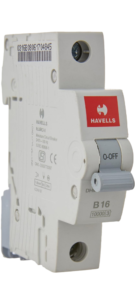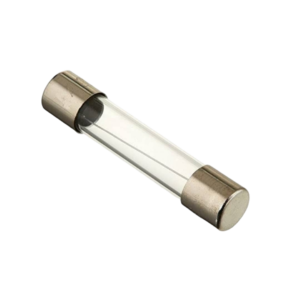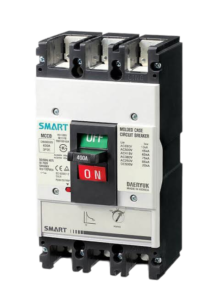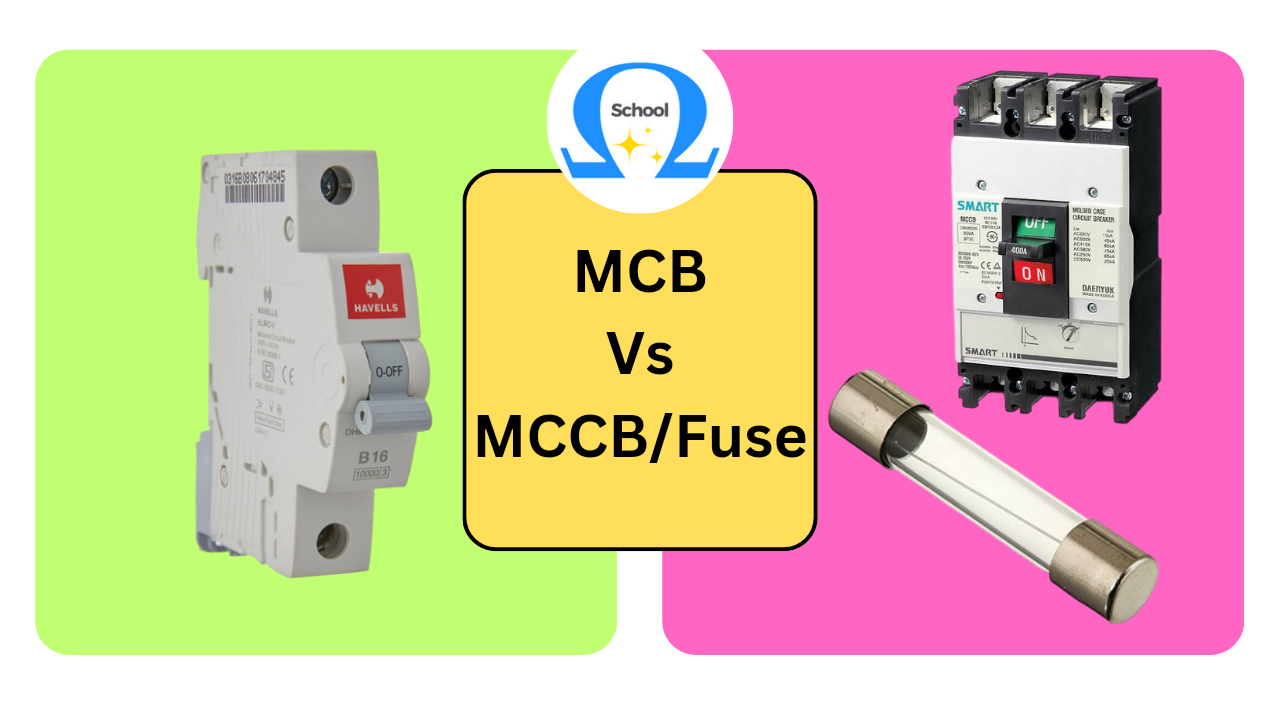In today’s electrical systems, safety and efficiency are crucial. To protect appliances, circuits, and people from electrical hazards like short circuits and overloads, we need reliable devices to cut off the power supply. Among the most common protective devices are MCB (Miniature Circuit Breaker), Electric Fuse, and MCCB (Molded Case Circuit Breaker).
While all three serve the same primary purpose—safeguarding electrical circuits—the way they function and their specific applications differ significantly. Let’s explore the advantages and disadvantages of MCBs over Electric Fuses and MCCBs to better understand their role in modern electrical systems.
What is an MCB?
An MCB is an automatic electrical switch that protects a circuit from overcurrent. It detects faults and automatically trips, cutting off power to prevent damage to the circuit. MCBs are commonly used in household electrical panels and small commercial setups. They are designed to handle currents up to 100A and are ideal for lower-capacity circuits.

Advantages of MCB Over Electric Fuse
- Reusable:
Unlike electric fuses, which melt when they detect an overload and need to be replaced, MCBs can simply be reset after tripping. This makes MCBs more convenient and cost-effective in the long run. - More Precise:
MCBs offer better accuracy in detecting overcurrent or short circuits. Electric fuses may not be as precise, sometimes tripping too late or too soon, leading to circuit damage or unnecessary interruptions. - Easy to Operate:
MCBs come with a simple on-off switch mechanism that can be manually controlled. In contrast, fuses require replacement, which can be tedious and time-consuming, especially in critical situations. - Faster Response Time:
MCBs have a quicker response time compared to traditional fuses. They trip instantly when detecting a fault, which minimizes the risk of damage to appliances and circuits. - Safety Features:
MCBs provide better protection as they can handle both overloads and short circuits, whereas a fuse typically protects only from overloads. Additionally, MCBs do not pose the risk of electric shocks during operation or replacement, unlike fuses which might need handling while the power is still active.

Disadvantages of MCB Over Electric Fuse
- Cost:
MCBs are more expensive than fuses. While MCBs offer many long-term benefits, their upfront cost is considerably higher than that of a fuse. - Complexity:
MCBs are slightly more complex in terms of installation and maintenance compared to the simple mechanism of a fuse. For large installations, multiple MCBs may be required, adding to the complexity. - Current Limitation:
MCBs are typically suitable for low to moderate current ratings, usually up to 100A. For higher current applications, MCCBs or other circuit breakers are needed.
Advantages of MCB Over MCCB
- Compact Size:
MCBs are smaller and more compact than MCCBs, making them ideal for residential and small commercial applications where space is limited. - Lower Cost for Small Applications:
For circuits with lower power requirements, MCBs are much more cost-effective compared to MCCBs, which are designed for industrial use and high-power applications. - Simple Installation:
MCBs are easier to install due to their smaller size and simpler wiring requirements. MCCBs, designed for larger setups, often require more complex installations.

Disadvantages of MCB Over MCCB
- Lower Current Capacity:
MCBs are limited to lower current ratings (up to 100A), while MCCBs can handle higher ratings (up to 2500A or more). For heavy-duty or industrial applications, MCCBs are necessary. - Limited Breaking Capacity:
The breaking capacity of an MCB is lower compared to an MCCB. If a circuit has a high fault level or requires a larger breaking capacity, MCCBs are more reliable. - Less Customization:
MCCBs offer adjustable trip settings, allowing for more precise control over the circuit protection. MCBs, on the other hand, have fixed trip settings, making them less flexible in certain applications.
Advantages and Disadvantages of MCB over MCCB – Table
| MCB | MCCB |
|---|---|
| MCB Protects circuits from overloads and short circuits in low-power applications (up to 100A). | Whereas MCCB designed for high-power applications, handling larger currents (up to 2500A or more). |
| MCB is Reusable after tripping, with a simple reset mechanism. | MCCB is also reusable, but built for more industrial and high-power scenarios with higher fault tolerance. |
| MCB has fixed trip settings, less flexible for customization. | MCCB offers adjustable trip settings, allowing better control over protection based on specific circuit requirements. |
| MCB is more cost-effective for residential and small commercial installations. | MCCB is more expensive, suitable for industrial setups where higher performance and durability are needed. |
| MCB is Faster response time for smaller circuits but less suited for heavy loads. | MCCB is quick response for larger faults and higher current levels, protecting more complex electrical systems. |
| MCB is Compact in size, ideal for small spaces like household distribution boards. | Whereas MCCB is Larger and bulkier, requiring more installation space due to its industrial-grade components. |
| MCB has Limited breaking capacity, typically used in environments where lower fault currents are expected. | MCCB has High breaking capacity, making it reliable for handling heavy machinery, large transformers, and high-fault level circuits. |
| MCB is easier to install and operate, with simple on/off toggle switches. | MCCB is more complex installation and operational procedures, often requiring professional handling due to its advanced features. |
| MCB is suitable for residential, small commercial, and low-power applications. | MCCB is designed primarily for industrial, large commercial, and high-power systems, including factories and heavy equipment. |
When to Use MCB, Electric Fuse, and MCCB?
- Use MCB:
MCBs are ideal for residential homes, small commercial installations, and areas where lower current capacity is needed. Their ease of use, reusability, and safety make them the preferred choice for everyday electrical protection. - Use Electric Fuse:
Fuses are still used in some older electrical systems and for very simple, low-cost applications. If cost is a critical factor and precision is not as essential, fuses can be a good choice, though they require replacement after each fault. - Use MCCB:
MCCBs are best for industrial and large commercial applications that require higher current capacities and better control over trip settings. Their robust construction and high breaking capacity make them suitable for protecting heavy machinery and high-power circuits.
Conclusion
Choosing between an MCB, electric fuse, and MCCB depends on your specific needs. MCBs offer a modern, efficient, and user-friendly solution for protecting electrical circuits, especially in residential and small commercial setups. They provide the convenience of reusability, faster response times, and better safety features. However, for high-power applications, MCCBs are the better choice, while fuses remain a low-cost solution for basic setups.
Understanding the advantages and disadvantages of MCBs compared to electric fuses and MCCBs will help you make the right decision when it comes to electrical safety and system reliability.
